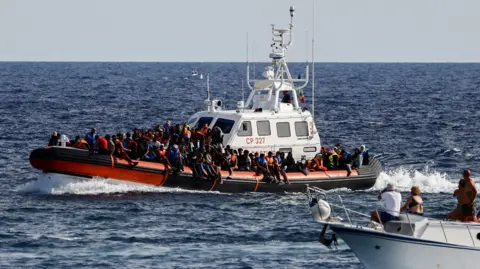Southern and eastern Europe correspondent
 Reuters
ReutersA ruling from the European Union Supreme Court dealt with Italy’s attempts to create a quick -track system in Albania to address asylum applications abroad.
The European Court of Justice (ECJ) said that the way the Italian government is currently defining whether the state is “safe” to return someone whose request is rejected by the European Union law.
This is the concept of “safe country” is essential in the deal that Prime Minister Georgia Meloni struck with Albania in 2023 to send immigrants who were intercepted at sea directly there for accelerating treatment.
Any person was supposed to be deported from a “safe state” who was rejected to resort within a week.
But Ecj has eliminated that the nation can only be included in the government list if all the population there are safe, which means that Italy will have to review its procedures.
Egypt and Bangladesh are currently determining, for example, as safe, with the acceptance that some groups there require protection.
The ruling brought an angry reaction from the government in Rome that the European Court was overcoming its role, adding that the decision would weaken countries’ ability to “defend the national borders.”
The European Court also said that the government must provide any evidence and sources that it uses to reach its conclusions regarding safe countries, so that the seekers of asylum can appeal their decision in their cases.
“Today, the court shows that a country cannot be appointed as a safe unless it provides effective and generalized protection, for everyone and everywhere, and unless the claim is independently verified,” Katia Scannavini explained from Italy.
“The alleged Albania model is collapsing in its legal essence,” she said.
The fate of the Albania project in Italy is closely monitored by other governments, including in the United Kingdom, which is keen to deal with asylum applications abroad because it tries to reduce the number of irregular migrants who reach their countries.
It means that the Albania deal has been subjected to the difficult axis of Meloni’s approach to migration, and it has achieved legal obstacles from the beginning. A handful of immigrants who were all sent to Italy was returned after lawyers intervened.
Often on the budget, the centers that have been built have not been used yet.
“This is greatly stopped in the Albania plan.”
In its decision, the European Court in principle did not object to the procedures for the rapid track of migrants from safe countries, but it made it clear that the implementation of this policy must change.
“It is essential: it is no longer possible to use the concept of” the country of safe origin “to carry out transportation operations to Albania until the Italian law is changed to match the legislation of the European Union,” said Adriana Tiona, Amnesty International Migration researcher.
“This greatly stops Italy’s plans in Albania.”
Pardon, like others, considers Albania to deal with a violation of human rights mainly. “This is not related to the countries of safe origin, but with the fact that it depends on an automatic detention system,” said Adriana Tedona. “This is illegal.”
It is not clear what a ruling today may cause the new European Union migration agreement that enters into force in the next year and presents a joint list of safe countries for the return – including Egypt and Bangladesh.
But the decision indicates that the definition of safe countries does not ultimately lies with politicians.
“The court says the judge is the one who has the authority to conduct assessments on safe countries,” explains Daniele Gallo, professor of European Union Law at Louis University in Rome. “Whatever the government says, every judge in Italy now has the duty to allocate Italian legislation and implement the European Union law.”
https://ichef.bbci.co.uk/news/1024/branded_news/fcf9/live/a6782df0-6f0c-11f0-9a81-5585e1b387d0.jpg
2025-08-01 20:11:00














